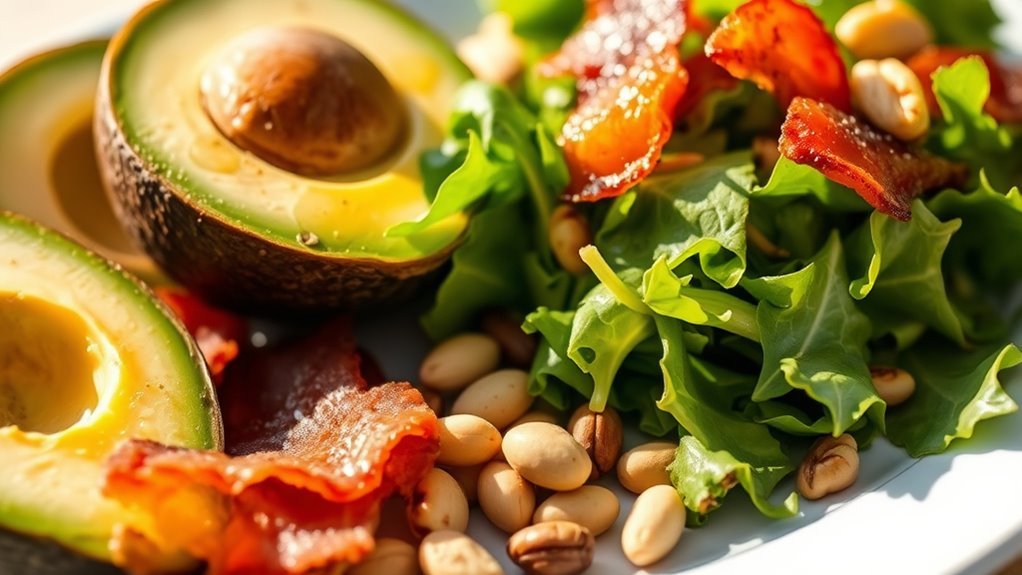The ketogenic diet can raise cholesterol levels for some people, often increasing LDL (bad) cholesterol while boosting HDL (good) cholesterol. Individual responses vary, so monitoring your cholesterol levels is vital to understand your health. Alongside these changes, the keto diet can lower triglycerides and promote heart health for many. It’s essential to focus on healthy fats and overall dietary balance to achieve the best results. You’ll find more insights on managing cholesterol with keto ahead.
Understanding Cholesterol: HDL vs. LDL

Cholesterol, a waxy substance found in your blood, plays a significant role in your body’s functions, but not all cholesterol is created equal. The two main cholesterol types are HDL (high-density lipoprotein) and LDL (low-density lipoprotein). HDL is often referred to as “good” cholesterol because it helps remove other cholesterol from your bloodstream, while LDL is considered “bad” as it can lead to plaque buildup in your arteries. Understanding these differences is important, especially when you’re considering healthy fats in your diet. Incorporating sources of healthy fats, like avocados and nuts, can boost your HDL levels, promoting heart health. Balancing these cholesterol types is essential for maintaining your freedom to enjoy a vibrant, healthy life.
The Basics of the Ketogenic Diet

Understanding the different types of cholesterol sets the stage for exploring dietary choices that can influence your heart health. The ketogenic diet, or keto, emphasizes low carbs and high fats to shift your body into a state of fat adaptation. Here are some key keto principles:
- Low carbohydrate intake: Typically around 20-50 grams per day.
- High healthy fats: Sources include avocados, nuts, and olive oil.
- Moderate protein: Important for muscle maintenance without kicking you out of ketosis.
- Focus on whole foods: Prioritize nutrient-dense options over processed foods.
- Hydration and electrolytes: Essential for overall health during the change.
How the Keto Diet Affects Cholesterol Levels

While shifting to the ketogenic diet, you might notice some changes in your cholesterol levels, which can be both surprising and concerning. Many people fall victim to keto misconceptions and cholesterol myths, assuming higher fat intake directly leads to unhealthy cholesterol. However, research shows that the keto diet can raise levels of HDL (the “good” cholesterol) while sometimes increasing LDL (the “bad” cholesterol). This variation isn’t necessarily harmful and can depend on individual factors like genetics and overall health. It’s crucial to focus not just on numbers but on how your body responds to dietary changes. Monitoring your cholesterol with a healthcare professional can help you navigate any concerns, ensuring you maintain a balanced approach to your health and freedom in your dietary choices.
Research Findings on Keto and Cholesterol
Recent studies on the ketogenic diet reveal a complex relationship between its high-fat nature and cholesterol levels. You might have heard various keto myths and cholesterol misconceptions, but the research paints a nuanced picture.
- Some individuals see an increase in HDL (good cholesterol).
- LDL (bad cholesterol) can also rise, but its particle size matters.
- Triglycerides often decrease considerably.
- Overall heart health may improve, depending on individual factors.
- Many people experience weight loss, which can positively influence cholesterol levels.
Understanding these findings can help you make informed decisions about the keto diet. It’s crucial to take into account your unique health needs and consult with a healthcare professional to navigate these complexities effectively.
Individual Variability in Cholesterol Response
When it comes to cholesterol response on a keto diet, individual variability plays a significant role. Genetic factors can influence how your body processes fats, while the specific composition of your diet and any pre-existing health conditions can further affect your cholesterol levels. Understanding these aspects is vital for tailoring the keto approach to suit your unique health profile.
Genetic Factors Impacting Cholesterol
Although many people experience changes in cholesterol levels on a keto diet, genetic factors play an essential role in how individuals respond to dietary fat intake. Your genetic predisposition can greatly influence your cholesterol response, especially if you have conditions like familial hypercholesterolemia. Here are some key genetic factors to evaluate:
- Variations in genes related to lipid metabolism
- Family history of high cholesterol levels
- Age and sex differences in cholesterol processing
- Impact of lifestyle factors on genetic expression
- Role of epigenetics in cholesterol regulation
Understanding these genetic influences can help you make informed decisions about your diet and health. Ultimately, individual variability means that not everyone will experience the same effects on cholesterol while following a keto diet.
Diet Composition Effects
Diet composition plays an essential role in how your body responds to cholesterol levels while on a keto diet. The types of dietary fats you consume can greatly influence your cholesterol profile. Prioritizing whole foods and maintaining a good nutrient balance can lead to healthier outcomes. Meal timing and portion control are also important—eating at regular intervals can help stabilize your metabolism. Don’t forget about fiber intake; it’s critical for digestive health and can aid in cholesterol management. Focus on food quality by choosing healthy fats, like avocados and nuts, over processed options. Finally, hydration strategies can support overall wellness, making it easier for your body to process fats effectively. Embracing these elements can empower you to optimize your diet.
Pre-existing Health Conditions
While various factors influence cholesterol levels, pre-existing health conditions greatly contribute to individual variability in how your body responds to a keto diet. If you have certain health concerns, you may experience different effects on your cholesterol, particularly regarding your keto heart health. Consider the following:
- Diabetes: Increased risk of cardiovascular complications.
- Hypertension: Potential for elevated cholesterol levels.
- Thyroid Disorders: Can affect lipid metabolism.
- Liver Disease: Impacts cholesterol synthesis and clearance.
- Genetic Factors: Conditions like familial hypercholesterolemia can alter responses.
Understanding these variables is essential as you navigate the keto diet. Always consult with a healthcare professional to tailor your approach, ensuring it aligns with your unique health profile. Your journey to wellness should empower you, not limit you.
Potential Benefits of the Keto Diet on Cholesterol
When considering the potential benefits of the keto diet on cholesterol, you might notice an increase in HDL cholesterol, often referred to as the “good” cholesterol. Additionally, many individuals report a reduction in triglyceride levels, which can be a positive indicator for heart health. Understanding these changes can help you evaluate how the keto diet might affect your overall cholesterol profile.
HDL Cholesterol Increase
One of the notable benefits of the keto diet is its potential to increase HDL cholesterol levels, which is often referred to as “good” cholesterol. Higher HDL cholesterol can support cardiovascular health and reduce the risk of heart disease. Here are some key points to evaluate:
- Improved HDL Levels: Keto may elevate HDL, enhancing its protective effects.
- Fat Sources: Healthy fats from avocados, nuts, and olive oil can boost HDL.
- Weight Loss: Shedding excess weight on keto often correlates with increased HDL levels.
- Inflammation Reduction: A higher HDL level may help lower inflammation markers.
- Cardiovascular Benefits: Elevated HDL is linked to a lower risk of heart-related issues.
Embracing these hdl benefits can empower your health journey!
Triglyceride Level Reduction
The keto diet is often recognized for its ability to markedly lower triglyceride levels, which can have a positive impact on overall heart health. By focusing on high-quality dietary fats while limiting carbohydrates, you may reduce triglyceride sources in your diet, promoting better lipid profiles.
| Dietary Fats | Triglyceride Sources | Impact on Health |
|---|---|---|
| Avocados | Sugary foods | Heart protection |
| Olive oil | Refined carbs | Reduced inflammation |
| Nuts and seeds | Processed snacks | Improved metabolic rate |
| Fatty fish | Starchy vegetables | Enhanced brain health |
Monitoring Cholesterol While on Keto
While following a keto diet, it’s essential to keep an eye on your cholesterol levels, as the high-fat nature of this eating plan can influence your lipid profile. Regular cholesterol testing helps you understand how your body responds to dietary adjustments. Here are some tips to monitor your cholesterol effectively:
- Schedule routine blood tests to track lipid levels.
- Keep a food diary to identify potential triggers.
- Consult a healthcare professional if you notice significant changes.
- Focus on healthy fats, like avocados and olive oil.
- Stay informed about the latest research on keto and cholesterol.
Making Informed Choices on a Keto Diet
Monitoring your cholesterol levels is just the start when it comes to making informed choices on a keto diet. Effective meal planning and thoughtful food choices can help you achieve nutrient balance while enjoying the freedom of this lifestyle. Consider incorporating diverse recipe ideas that prioritize healthy fats and protein sources, ensuring long-term sustainability. Adjust your lifestyle by practicing portion control and selecting satisfying snack options that align with your goals. When dining out, be mindful of ingredient choices and don’t hesitate to ask about preparation methods. Health education is key; stay informed about how different foods affect your body. By blending these strategies, you can enjoy the benefits of keto while maintaining your overall health and well-being.
Frequently Asked Questions
1. Does the Keto Diet lead to an increase in cholesterol levels?
The Keto Diet can lead to changes in cholesterol levels, but the effects can vary significantly among individuals. Some people may experience an increase in LDL cholesterol (often referred to as “bad” cholesterol), while others may see an increase in HDL cholesterol (“good” cholesterol). It’s important to monitor your cholesterol levels through regular blood tests and consult with a healthcare provider to understand how the diet is affecting your body.
2. Why might the Keto Diet raise LDL cholesterol levels?
The increase in LDL cholesterol during the Keto Diet may be attributed to a higher intake of saturated fats from sources like meat, dairy, and coconut oil. Some studies suggest that dietary fat may increase LDL levels, but it’s also crucial to note that not all LDL particles are harmful. The size and density of LDL particles can influence cardiovascular risk, and some individuals may experience beneficial changes in their lipid profiles despite higher LDL levels.
3. Can the Keto Diet improve overall heart health despite changes in cholesterol?
Yes, the Keto Diet can improve heart health for some individuals by promoting weight loss, reducing triglycerides, and increasing HDL cholesterol levels. These changes can contribute to a lower risk of heart disease. However, it’s essential to focus on healthy fats (like avocados, nuts, and olive oil) and maintain a balanced intake of nutrients. Regular check-ups with a healthcare provider are recommended to monitor heart health as you follow the diet.
4. Should I be concerned about cholesterol levels on the Keto Diet?
While some individuals may experience an increase in cholesterol levels on the Keto Diet, it’s crucial to evaluate individual health factors such as family history, existing health conditions, and overall lifestyle. Regular testing can help you and your healthcare provider assess whether any changes in cholesterol are concerning. If you have a history of heart disease or other risk factors, a tailored approach to your diet may be necessary.
5. What steps can I take to manage cholesterol levels while on the Keto Diet?
To manage cholesterol levels on the Keto Diet, consider the following steps:
- Focus on Healthy Fats: Prioritize unsaturated fats from sources like olive oil, avocados, and fatty fish.
- Increase Fiber Intake: Include low-carb vegetables and high-fiber foods to support heart health.
- Monitor Portion Sizes: Be mindful of saturated fat intake, especially from processed meats and full-fat dairy.
- Regular Health Check-ups: Keep track of your cholesterol levels with your healthcare provider to make informed dietary choices.
These strategies can help mitigate potential negative effects on cholesterol while allowing you to enjoy the benefits of the Keto Diet.
References
- https://www.ncbi.nlm.nih.gov/pmc/articles/PMC6520652/
- https://www.health.harvard.edu/staying-healthy/the-truth-about-the-ketogenic-diet
- https://www.mayoclinic.org/diseases-conditions/high-blood-cholesterol/expert-answers/keto-diet-and-cholesterol/faq-20444309
- https://www.webmd.com/diet/what-to-know-about-keto-diet
- https://www.cdc.gov/heartdisease/cholesterol.htm
- https://www.heart.org/en/news/2021/01/25/the-keto-diet-and-heart-health-what-you-need-to-know
- https://www.livescience.com/what-is-the-keto-diet.html
- https://www.verywellfit.com/the-ketogenic-diet-5110798


